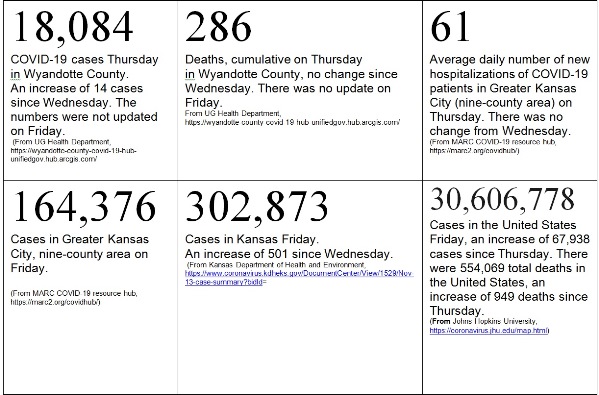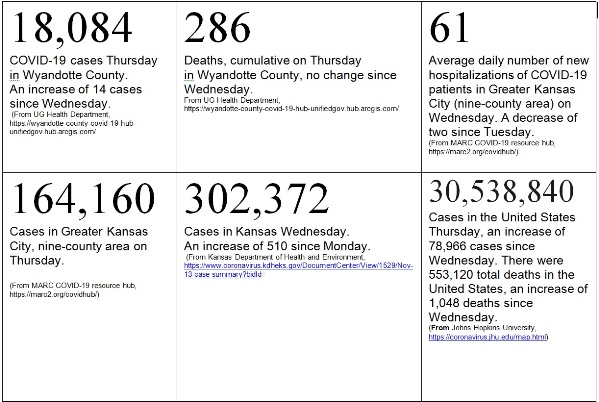
A Centers for Disease Control and Prevention emerging variant known as the South African variant has been identified in Kansas, according to the Kansas Department of Health and Environment.
An individual in Finney County was found to have the B.1.351 variant, the KDHE stated. Finney County is in southwest Kansas, and its largest city is Garden City.
A case investigation is being conducted to determine how the person became infected with this particular variant of the SARS-CoV-2 virus, as well as if others may have been exposed.
The variant was determined through the whole genome sequencing conducted through the laboratories at the Kansas Department of Health and Environment.
The B.1.351 variant was originally identified in South Africa in December and has been found in 31 states and territories in the United States. At this point, it is not known to cause more severe disease and it is not clear whether it spreads more readily than other strains, according to the KDHE.
Although this strain can reduce the effectiveness of some vaccines, vaccines still provide strong protection against severe illness and death, the KDHE stated.
“We continue to encourage people to take the appropriate precautions. This includes wearing a mask that fits snuggly around the nose and face and has multiple layers of fabric or layering thinner masks with an additional cloth face mask to improve the fit,” Dr. Lee Norman, KDHE secretary, said. “Kansans should also follow isolation and quarantine recommendations, practice physical distancing, good hygiene, staying home if ill and getting the vaccine if you are able to.”
Another variant, B.1.1.7, also known as the UK variant, has previously been identified in Kansas.
There are currently 76 cases of the UK variant identified in 14 counties, the KDHE stated. This variant was first reported in the United States at the end of December 2020.
Evidence from the UK indicates that this variant spreads much more quickly through the population and, given that fact, may rapidly increase the number of hospitalizations and deaths, according to the KDHE. More studies are needed to confirm this finding.
Testing is available and free for all Kansans. To find a location near you, visit: www.gogettested.com/kansas.
The variants were discussed briefly at the University of Kansas Health System’s news conference on Friday morning.
When asked if the vaccine could make someone more sick after exposure to one of the variants, the panelists did not think the variants should affect a decision to get the vaccine.
Lance Williamson, RN, infection prevention and control nurse supervisor, said variants should not affect a decision to get a vaccination. Some of the vaccines do better against variants than it was originally thought, according to Williamson.
He said the Johnson and Johnson vaccine was rolled out in South Africa, which had the major variant there, and it was very effective. Scientists currently are keeping an eye on vaccines’ effect on variants, he said. The vaccines, he believes, are effective against the variants found in the communities, he added.
Dr. Dana Hawkinson, medical director of infection prevention and control at KU Health System, said there is data showing that there was a good immune response to variants from people who had been vaccinated.
Pfizer has released information about 800 people studied in South Africa who received the Pfizer vaccination. The vaccine was more than 90 percent effective against symptomatic disease, he said. The mRNA vaccines, particularly Pfizer, have shown it protects against those variants, he said.
The KDHE’s vaccine report for April 1 stated that next week, Kansas expects to get 38,610 Pfizer first doses and 38,100 Pfizer second doses. The state expects to receive 29,000 Moderna first doses and 27,800 Moderna second doses next week. Also, Kansas expects to receive 41,800 Janssen (Johnson and Johnson) vaccine doses next week, according to the vaccine report. State health officials have said numbers of the Johnson and Johnson vaccine may be less than what has been expected.
A total of 371,230 doses have been distributed to 19 federally qualified health centers that are giving vaccinations in Kansas, according to the state’s vaccination website.
KDHE reported 1.3 million total doses administered in Kansas, including first and second doses, for 29.8 percent of the Kansas population vaccinated.
COVID-19 case numbers reported
The University of Kansas Health System reported 10 active COVID-19 patients on Friday morning, a decrease of one from Thursday, according to Dr. Hawkinson. Of the 10 patients, five were in the intensive care unit, no change from Thursday. One patient was on a ventilator, no change since Thursday. There were another 16 COVID-19 patients who were hospitalized but are out of the acute infection phase, an increase of one since Thursday. There is a total 26 patients, the same as Thursday.
Wyandotte County reported an increase of 14 COVID-19 cases on Thursday, April 1, from Wednesday, March 31, for a cumulative 18,084 cases. There was a cumulative total of 286 deaths reported, no change from Wednesday. The numbers were not updated on Friday, a UG holiday. However, the Kansas Department of Health and Environment on Friday reported that cases increased by 46 from Wednesday to Friday in Wyandotte County.
The Mid-America Regional Council’s COVID-19 dashboard reported 164,376 cumulative COVID-19 cases on Friday, an increase of 216. The daily average of new hospitalizations was 61. The number of cumulative deaths was 2,339, an increase of seven.
The state of Kansas reported 302,873 cumulative COVID-19 cases on Friday, April 2, an increase of 501 cases since Wednesday. There were a total cumulative 4,932 deaths reported statewide, an increase of 19 deaths. According to the KDHE, there were a cumulative 56,299 cases in Johnson County, with an increase of 140 cases between Wednesday and Friday. There were a cumulative 54,861 cases in Sedgwick County on Friday, an increase of 72 cases between Wednesday and Friday. The KDHE reported a total 7,069 cases in Leavenworth County on Friday an increase of 18 cases between Wednesday and Friday. There were 16,967 cumulative cases in Shawnee County, the Topeka area, on Friday, an increase of 71 between Wednesday and Friday.
The Johns Hopkins University COVID-19 dashboard on Friday night reported 30,606,778 cases in the United States, an increase of 67,938 cases, with 554,069 total deaths reported nationwide, an increase of 949 deaths.
Vaccinations available Monday
Free vaccinations will be available between 9 a.m. and 2:30 p.m. Monday, April 5, at the three Health Department vaccination sites in Wyandotte County. They are accepting walk-in appointments from Wyandotte County residents over age 16.
The Unified Government Health Department has launched a new self-scheduling tool for COVID-19 vaccinations, and people are now able to schedule their own vaccinations at their own convenience online.
The self-scheduling tool is at https://vaccines.wycokck.org/, or people may call 3-1-1 to make an appointment. More information is at https://wyandotteonline.com/ug-health-department-launches-new-self-scheduling-tool-for-covid-19-vaccinations/.
Residents 16 and older may either walk in to get a free vaccine or may schedule an appointment. There are three Unified Government Health Department vaccination clinics.
The vaccination sites are open from 9 a.m. to 2:30 p.m. Monday through Friday at the former Kmart store at 7836 State Ave., the former Best Buy store at 10500 Parallel Parkway and the Kansas National Guard Armory at 100 S. 20th (near 18th and Ridge).
Those Wyandotte County residents in Phases 1 to 4 also may walk in to a Health Department vaccination site, or may sign up for a vaccination at WycoVaccines.org or call 3-1-1.
Those who walk in to get vaccines should bring an ID and something showing their Wyandotte County address, such as mail. For more information about vaccines at the UG Health Department, visit https://wyandotte-county-covid-19-vaccines-unifiedgov.hub.arcgis.com/.
There are also pharmacies giving COVID-19 vaccinations in Wyandotte County by appointment, when available. These include Price Chopper and Hen House pharmacy at 76th and State Avenue, and 81st and State Avenue (see https://www.ballsfoodspharmacy.com/), and Medicine Shoppe pharmacy at 65th and Parallel by appointment when available (see https://www.facebook.com/The-Medicine-Shoppe-Kansas-City-281548241870522). CVS pharmacy also has announced that it will offer COVID-19 vaccines at one of its stores in Kansas City, Kansas. Registration is at CVS.com.
COVID-19 tests scheduled
COVID-19 testing is available at 8 a.m. Saturday at Lowe’s, 6920 State Ave., by appointment. The tests are listed on the Go Get Tested site
at www.gogettested.com/Kansas. The WellHealth tests need appointments, which can be made at the website.
Unified Government Health Department COVID-19 testing and vaccine sites are scheduled to be open on Monday, April 5. For more information, visit https://wyandotte-county-covid-19-hub-unifiedgov.hub.arcgis.com/pages/what-to-do-if-you-think-you-have-covid-19. To see if there is any change to the schedule, visit https://www.facebook.com/UGHealthDept.
The Health Department is offering saliva COVID-19 tests to the public. Tests from the Health Department are free for those who live or work in Wyandotte County.
The tests are open to asymptomatic people as well as those who have symptoms or have been exposed to COVID-19. Check with the UG Health Department’s Facebook page to see if there have been any changes in the schedule. Bring something that shows that you live or work in Wyandotte County, such as a utility bill.
The Health Department’s general contact page is at https://www.wycokck.org/Health/Contact.aspx. Their Facebook page is at https://www.facebook.com/UGHealthDept.
Testing sites are at https://wyandotte-county-covid-19-hub-unifiedgov.hub.arcgis.com/pages/what-to-do-if-you-think-you-have-covid-19.
Saliva testing is now offered at the UG Health Department. For more information, visit https://alpha.wycokck.org/files/assets/public/health/documents/covid/02042021-ugphd-saliva-testing-available.pdf.
The doctors’ news conference is online at https://www.facebook.com/kuhospital/videos/1882565778567501.
The University of Kansas Health System COVID-19 update page is at https://www.facebook.com/kuhospital/videos/292961702392386.
A weekly vaccine report for the state of Kansas is at
https://www.kansasvaccine.gov/DocumentCenter/View/123/Vaccine-Historical-Document-22521?bidId=.
Wyandotte County has a local mask and social distancing ordinance approved by the UG Commission. The UG COVID-19 webpage is at https://alpha.wycokck.org/Coronavirus-COVID-19-Information.
The KDHE’s COVID-19 webpage is at https://www.coronavirus.kdheks.gov/.
The KC Region COVID-19 Hub dashboard is at https://marc2.org/covidhub/.
The Wyandotte County page on the Johns Hopkins COVID-19 website is at https://bao.arcgis.com/covid-19/jhu/county/20209.html.
The Johns Hopkins Data in Motion, a presentation on critical COVID-19 data in the past 24 hours, is at https://coronavirus.jhu.edu/covid-19-daily-video.

